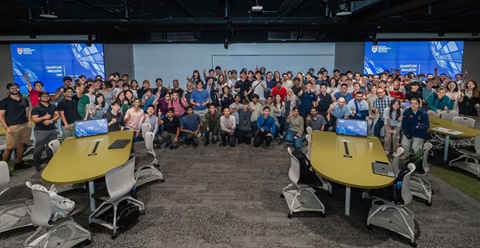IAS-SSS Distinguished Speaker Public Lecture by Nobel Laureate Prof Joshua Angrist and Renowned Economist Prof Matthew Jackson
Zach Lee | Research Associate (Economics), HSS

Social mobility can be likened to a lubricant that allows the cogs of a modern well-functioning society to turn smoothly. How can we understand the factors and mechanisms that facilitate and drive such social mobility?
On 27 July 2023, NTU’s Institute of Advanced Studies (IAS) and School of Social Sciences (SSS) jointly hosted a public lecture with two esteemed economists, Prof Joshua Angrist and Prof Matthew Jackson, to shed more light on this. Prof Angrist from MIT is the 2021 Nobel Prize laureate in Economic Sciences, and Prof Jackson is the William D. Eberle Professor of Economics at Stanford University. Sponsored by the Lee Foundation, the public lecture at the Singapore Hokkien Huay Kuan Auditorium, NTU was attended by close to 300 participants. Prof Sum Tze-Chien, Director of IAS, delivered a welcome address, followed by opening remarks from our Guest-of-Honour, Prof Luke Ong, Vice President (Research), NTU.
Prof Angrist spoke on "Escaping the Elite Illusion." His lecture sought to debunk the notion that an education from highly selective, elite institutions is the sole path to economic success. Prof Angrist received the Nobel Prize based on his development of techniques that can be applied to natural experiments, in the sense of real-life occurrences akin to randomised lab experiments. These techniques help us to understand underlying causes of outcomes in a complex society, such as in the case of education. His work suggests that the primary determinant of long-term prosperity is not the prestige of the educational institution, but instead the quality of teaching and the dedication of students which matter more than institution's branding. These factors contribute more significantly to social mobility, emphasising that the ability to succeed should not be restricted to a select few who attend elite institutions. Prof Angrist argued that elite schools do not necessarily offer a better education, and success is instead correlated with the abilities and efforts of the students who attend these schools. As such, he advocated for policies that promote and broaden equal access to quality education across all socio-economic levels.
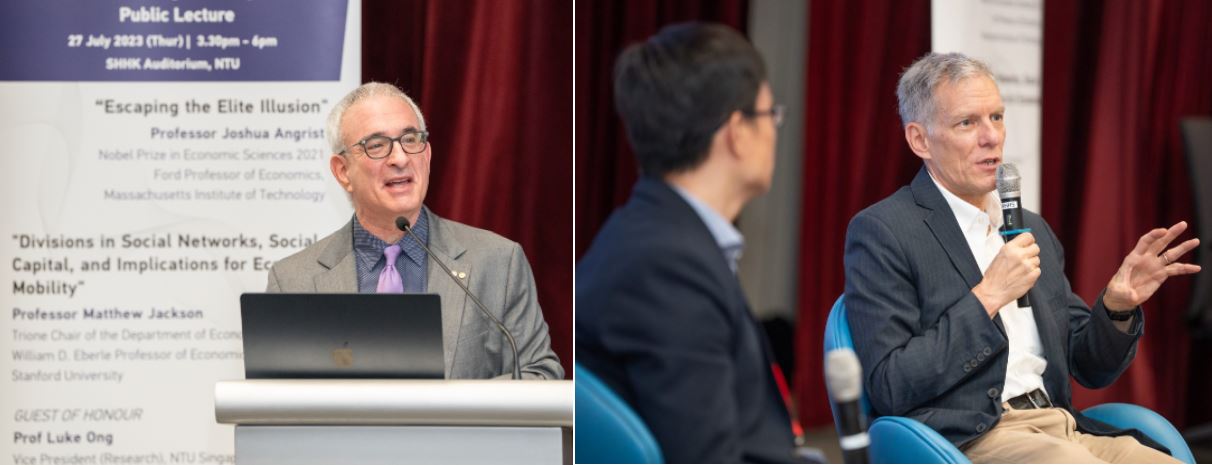 [left] Prof Angrist giving an overview of his work that garnered him the Nobel Prize. [right] Prof Jackson answering a question on the determinants of economic mobility.
[left] Prof Angrist giving an overview of his work that garnered him the Nobel Prize. [right] Prof Jackson answering a question on the determinants of economic mobility.
Prof Jackson gave an overview of his research on social networks and economic mobility, providing us with another lens through which to view social mobility. His lecture "Divisions in Social Networks, Social Capital, and Implications for Economic Mobility" explored how social capital, advantages and opportunities that individuals gain from their social networks can influence economic mobility. Using data from Facebook, Prof Jackson showed that children from lower socio-economic backgrounds often have less access to beneficial social networks, hindering their economic mobility. As such, social capital plays a significant role in predicting economic mobility, especially for underprivileged children. This notion of network inequality therefore emphasises the need for interventions and policies that can bridge social divisions, promote inclusivity and expand access to valuable social networks for those from disadvantaged backgrounds, thereby promoting social mobility.
Taken together, the works of both Prof Angrist and Prof Jackson underscore the importance of making high-quality education and robust social networks accessible to all, regardless of their socio-economic background. In doing so, we can ensure a more equal distribution of opportunities, fostering a society where social mobility is indeed the norm, and talent and hard work are the primary determinants of an individual's economic success. This dynamic, in turn, fuels societal progress and can lead to a more prosperous and equitable society.

Engaging audience of the public lecture
The lectures were well-received by a diverse audience, including students, academics, and members of the public. The insightful presentations from both professors sparked lively Q&A sessions that were moderated respectively by Prof Euston Quah, Albert Winsemius Chair Professor of Economics, and Prof Feng Qu, Head of the Economics Programme at NTU. The Q&A sessions fostered a vibrant intellectual discourse on their research, advice for budding academics, and very topical societal questions from the public.
A very pertinent question from the audience was how we should reconcile the importance of education quality, as emphasised by Prof Angrist, with the critical role of social networks and connections in economic mobility, as pointed out by Prof Jackson. Prof Jackson gave a very thoughtful response that while education is undoubtedly vital, the social networks that individuals form outside of education can be equally crucial in determining their economic trajectory. People from disadvantaged backgrounds often lack access to beneficial networks. Hence, a focus on social capital, in addition to education quality, is essential for comprehensive social mobility.
I also had a chance to ask Prof Angrist what he thought of the latest research from Chetty, Fleming and Friedman on “Diversifying Society’s Leaders? The Determinants and Causal Effects of Admission to Highly Selective Private Colleges”. He succinctly replied that the implications are the same – it is the quality of education that matters, not the brand name. There is little value-add from a student attending an elite private college who comes from the 99th-percentile income bracket in the USA.
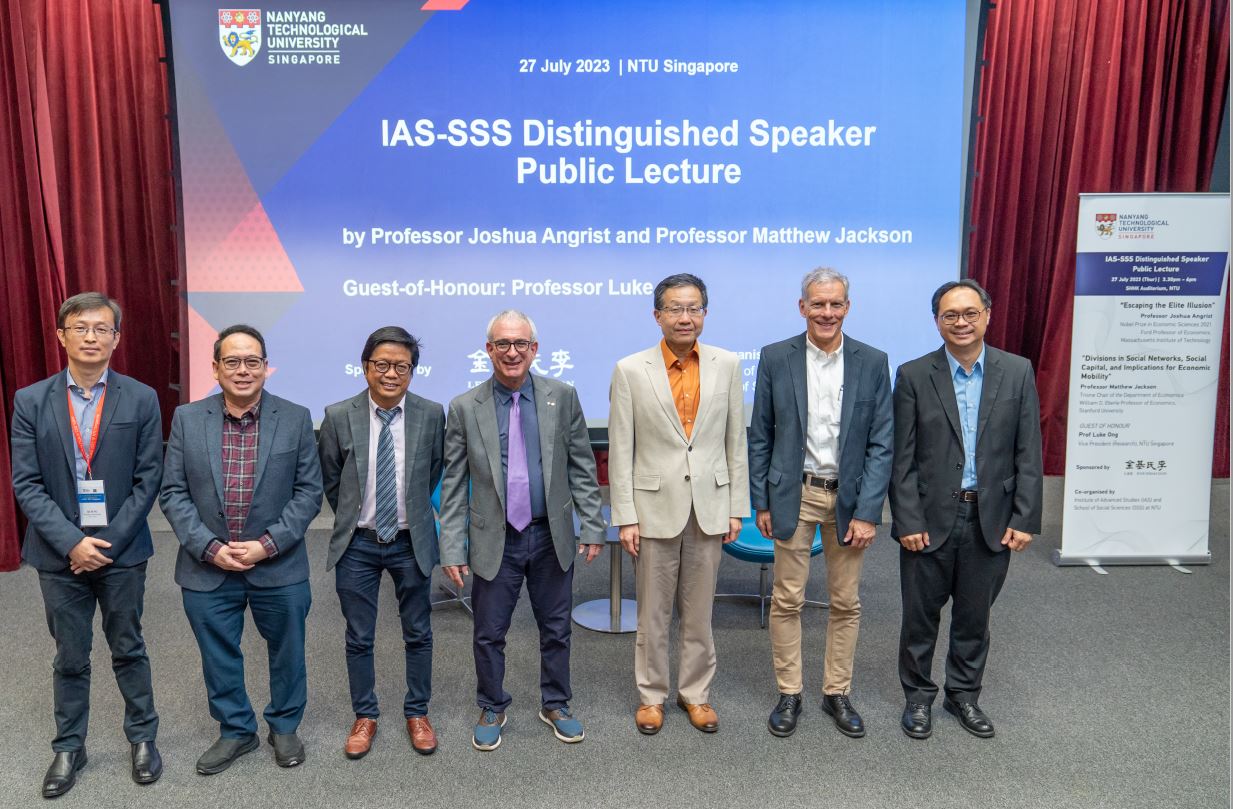
[from left] Assoc Prof Feng Qu (SSS), Prof Euston Quah (SSS), Prof Eko Riyanto (Chair, SSS), Prof Joshua Angrist, Prof Luke Ong (Vice President, Research, and Distinguished University Professor), Prof Matthew Jackson and Prof Sum Tze-Chien (Director, IAS)
The two speakers also dispensed wisdom on how junior academics and PhD students can approach teaching. Both professors emphasised the importance of making the material engaging, relevant, and interconnected. While their specific advice might reflect their individual research focuses, the underlying theme is to foster a deep, thoughtful understanding of the subject matter, coupled with an awareness of its real-world applications and societal impact. They advocated for teaching methods that encourage active participation, collaboration, and critical thinking, in line with student-centered pedagogical approaches.
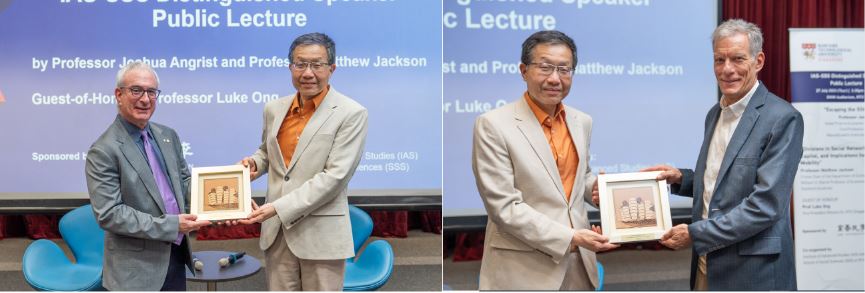 Prof Luke Ong presenting mementos to our distinguished speakers
Prof Luke Ong presenting mementos to our distinguished speakers
NTU is grateful for the professors' valuable contributions and is committed to hosting similar engaging events in the future, as part of its mission to facilitate the dissemination of knowledge beyond academia.
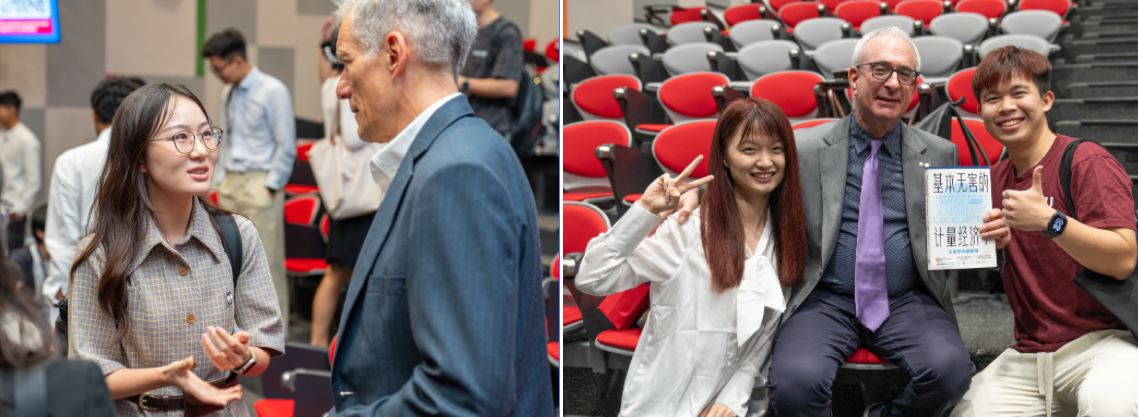 Students interacting with the speakers after the lecture
Students interacting with the speakers after the lecture

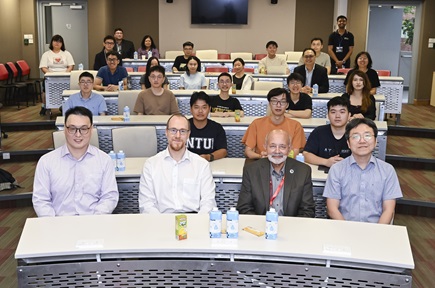
.tmb-listing.jpg?Culture=en&sfvrsn=c45c3c7e_1)
